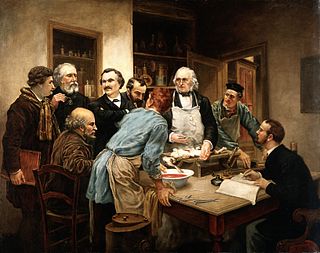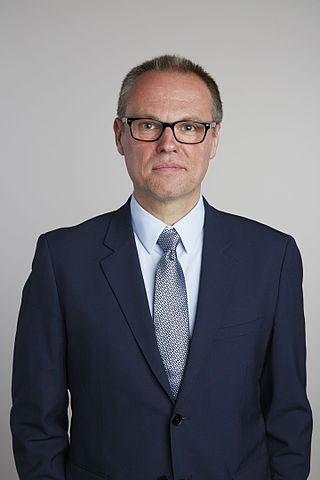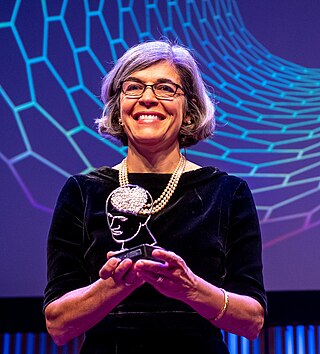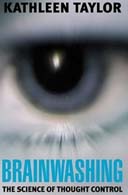Related Research Articles
Brainwashing is the concept that the human mind can be altered or controlled by certain psychological techniques. Brainwashing is said to reduce its subject's ability to think critically or independently, to allow the introduction of new, unwanted thoughts and ideas into their minds, as well as to change their attitudes, values, and beliefs.

Neuroscience is the scientific study of the nervous system, its functions and disorders. It is a multidisciplinary science that combines physiology, anatomy, molecular biology, developmental biology, cytology, psychology, physics, computer science, chemistry, medicine, statistics, and mathematical modeling to understand the fundamental and emergent properties of neurons, glia and neural circuits. The understanding of the biological basis of learning, memory, behavior, perception, and consciousness has been described by Eric Kandel as the "epic challenge" of the biological sciences.

Physiology is the scientific study of functions and mechanisms in a living system. As a subdiscipline of biology, physiology focuses on how organisms, organ systems, individual organs, cells, and biomolecules carry out chemical and physical functions in a living system. According to the classes of organisms, the field can be divided into medical physiology, animal physiology, plant physiology, cell physiology, and comparative physiology.

Cognitive neuroscience is the scientific field that is concerned with the study of the biological processes and aspects that underlie cognition, with a specific focus on the neural connections in the brain which are involved in mental processes. It addresses the questions of how cognitive activities are affected or controlled by neural circuits in the brain. Cognitive neuroscience is a branch of both neuroscience and psychology, overlapping with disciplines such as behavioral neuroscience, cognitive psychology, physiological psychology and affective neuroscience. Cognitive neuroscience relies upon theories in cognitive science coupled with evidence from neurobiology, and computational modeling.

Patricia Smith Churchland is a Canadian-American analytic philosopher noted for her contributions to neurophilosophy and the philosophy of mind. She is UC President's Professor of Philosophy Emerita at the University of California, San Diego (UCSD), where she has taught since 1984. She has also held an adjunct professorship at the Salk Institute for Biological Studies since 1989. She is a member of the Board of Trustees Moscow Center for Consciousness Studies of Philosophy Department, Moscow State University. In 2015, she was elected a Fellow of the American Academy of Arts & Sciences. Educated at the University of British Columbia, the University of Pittsburgh, and Somerville College, Oxford, she taught philosophy at the University of Manitoba from 1969 to 1984 and is married to the philosopher Paul Churchland. Larissa MacFarquhar, writing for The New Yorker, observed of the philosophical couple that: "Their work is so similar that they are sometimes discussed, in journals and books, as one person."

The brain is the central organ of the human nervous system, and with the spinal cord makes up the central nervous system. The brain consists of the cerebrum, the brainstem and the cerebellum. It controls most of the activities of the body, processing, integrating, and coordinating the information it receives from the sense organs, and making decisions as to the instructions sent to the rest of the body. The brain is contained in, and protected by, the skull bones of the head.

A neuroscientist is a scientist who has specialised knowledge in neuroscience, a branch of biology that deals with the physiology, biochemistry, psychology, anatomy and molecular biology of neurons, neural circuits, and glial cells and especially their behavioral, biological, and psychological aspect in health and disease.
John Frederick Stein is a British physiologist. He is a fellow of Magdalen College, Oxford, and holds a professorship in physiology at the University of Oxford. He has research interests in the neurological basis of dyslexia.

Gero Andreas Miesenböck is an Austrian scientist. He is currently Waynflete Professor of Physiology and Director of the Centre for Neural Circuits and Behaviour (CNCB) at the University of Oxford and a fellow of Magdalen College, Oxford.

Cornelia Isabella "Cori" Bargmann is an American neurobiologist. She is known for her work on the genetic and neural circuit mechanisms of behavior using C. elegans, particularly the mechanisms of olfaction in the worm. She has been elected to the National Academy of Sciences and had been a Howard Hughes Medical Institute investigator at UCSF and then Rockefeller University from 1995 to 2016. She was the Head of Science at the Chan Zuckerberg Initiative from 2016 to 2022. In 2012 she was awarded the $1 million Kavli Prize, and in 2013 the $3 million Breakthrough Prize in Life Sciences.
UCL Neuroscience is a research domain that encompasses the breadth of neuroscience research activity across University College London's (UCL) School of Life and Medical Sciences. The domain was established in January 2008, to coordinate neuroscience activity across the many UCL departments and institutes in which neuroscience research takes place. In 2014, the Nobel Prize in Physiology or Medicine was awarded to the UCL neuroscientist John O'Keefe. In two consecutive years 2017 and 2018, the Brain Prize, the world's most valuable prize for brain research at €1m, was awarded to UCL neuroscientists Peter Dayan, Ray Dolan, John Hardy, and Bart De Strooper.

Anna Christina Nobre FBA, MAE, fNASc is a Brazilian and British cognitive neuroscientist working at Yale University in New Haven, CT, USA.

C. Sue Carter is an American biologist and behavioral neurobiologist. She is an internationally recognized expert in behavioral neuroendocrinology. In 2014 she was appointed Director of The Kinsey Institute and Rudy Professor of Biology at Indiana University. Carter was the first person to identify the physiological mechanisms responsible for social monogamy.

Brainwashing: The Science of Thought Control is a 2004 popular science book explaining mind control, which is also known as brainwashing, thought reform and coercive persuasion, by neuroscientist and physiologist Kathleen Taylor. It explains the neurological basis for reasoning and cognition in the brain, and proposes that the self is changeable, and describes the physiology of neurological pathways. It reviews case studies including Patty Hearst, the Manson Family, and the mass murder/suicide of members of Peoples Temple at Jonestown, and compares the techniques of influence used by cults to those of totalitarian and communist societies. It lays out a model FACET – Freedom, Agency, Complexity, Ends-not-means, and Thinking – which she believes can be used to negate the influence of brainwashing techniques.
Hanna Damasio is a scientist in the field of cognitive neuroscience. Using computerized tomography and magnetic resonance imaging, she has developed methods of investigating human brain structure and studied functions such as language, memory, and emotion, using both the lesion method and functional neuroimaging. She is currently a Dana Dornsife Professor of Neuroscience and Director of the Dana and David Dornsife Cognitive Neuroscience Imaging Center at the University of Southern California.

Wim E. Crusio is a Dutch behavioral neurogeneticist and a directeur de recherche with the French National Centre for Scientific Research in Talence, France.

Marian Cleeves Diamond was an American neuroscientist. She and her team were the first to publish evidence that the brain can change with experience and improve with enrichment, what is now called neuroplasticity. She was a professor of anatomy at the University of California, Berkeley.
Marianne Fillenz was a Neuroscientist at the University of Oxford.

Irene Mary Carmel Tracey is Vice-Chancellor of the University of Oxford and former Warden of Merton College, Oxford. She is also Professor of Anaesthetic Neuroscience in the Nuffield Department of Clinical Neurosciences and formerly Pro-Vice-Chancellor at the University of Oxford. She is a co-founder of the Oxford Centre for Functional Magnetic Resonance Imaging of the Brain (FMRIB), now the Wellcome Centre for Integrative Neuroimaging. Her team’s research is focused on the neuroscience of pain, specifically pain perception and analgesia as well as how anaesthetics produce altered states of consciousness. Her team uses multidisciplinary approaches including neuroimaging.

Sabine Kastner is a German-born American cognitive neuroscientist. She is professor of psychology at the Princeton Neuroscience Institute at Princeton University. She also holds a visiting scientist appointment at the University of California at Berkeley.
References
- ↑ "IFBB appoints new Science Fellow Archived 2 April 2015 at the Wayback Machine ," Institute for Food Brain and Behaviour website, 19 July 2012. Accessed 29 March 2015.
- ↑ "INSTITUTE FOR FOOD, BRAIN AND BEHAVIOUR, registered charity no. 517817". Charity Commission for England and Wales.
- 1 2 3 4 5 6 Taylor, Kathleen E. (July 2006). "Intergroup atrocities in war: a neuroscientific perspective". Medicine, Conflict and Survival. 22 (3): 230–244. CiteSeerX 10.1.1.140.7673 . doi:10.1080/13623690600772592. ISSN 1743-9396. PMID 16961124. S2CID 494446.
- ↑ Staff (12 April 2005). "Evil influence is all washed up – Education". The Times . Times Newspapers Ltd. p. Public Agenda 8.
- ↑ Szimhart, Joseph (July–August 2005). "Thoughts on thought control". Skeptical Inquirer . 29 (4). Committee for the Scientific Investigation of Claims of the Paranormal: 56–57.
- ↑ Taylor, Kathleen (8 November 2002). "Is imagination more important than knowledge? Einstein". Times Higher Education. TSL Education Ltd. Retrieved 2 November 2008.
- ↑ Taylor, Kathleen (2004). Brainwashing: The Science of Thought Control. Oxford University Press. Front matter. ISBN 978-0-19-920478-6.
- 1 2 "Brainwashing: The Science of Thought Control – By Kathleen Taylor – Longlisted, General Prize 2005". The Royal Society. royalsociety.org. Archived from the original on 10 June 2008. Retrieved 1 November 2008.
- ↑ Staff (2005). "Aventis Prizes 2005 – Special Reports". The Guardian . Guardian News and Media Limited. Retrieved 2 November 2008.
- ↑ , review, The Guardian, 4-18-2009
- ↑ Yuhas, Daisy. "MIND Reviews: The Brain Supremacy," Scientific American MIND, 14 Feb. 2013. Retrieved 29 March 2015.
- ↑ "The Brain Supremacy: Notes from the Frontiers of Neuroscience," review in Kurzweil Accelerating Intelligence newsletter, 1 Nov. 2012. Accessed 29 March 2015.
- ↑ "The Brain Supremacy Notes from the frontiers of neuroscience Archived 2 April 2015 at the Wayback Machine ," publisher's notes, 25 Oct. 2012. Accessed 29 March 2015.
- ↑ , Review, Nature , 12-10-2016